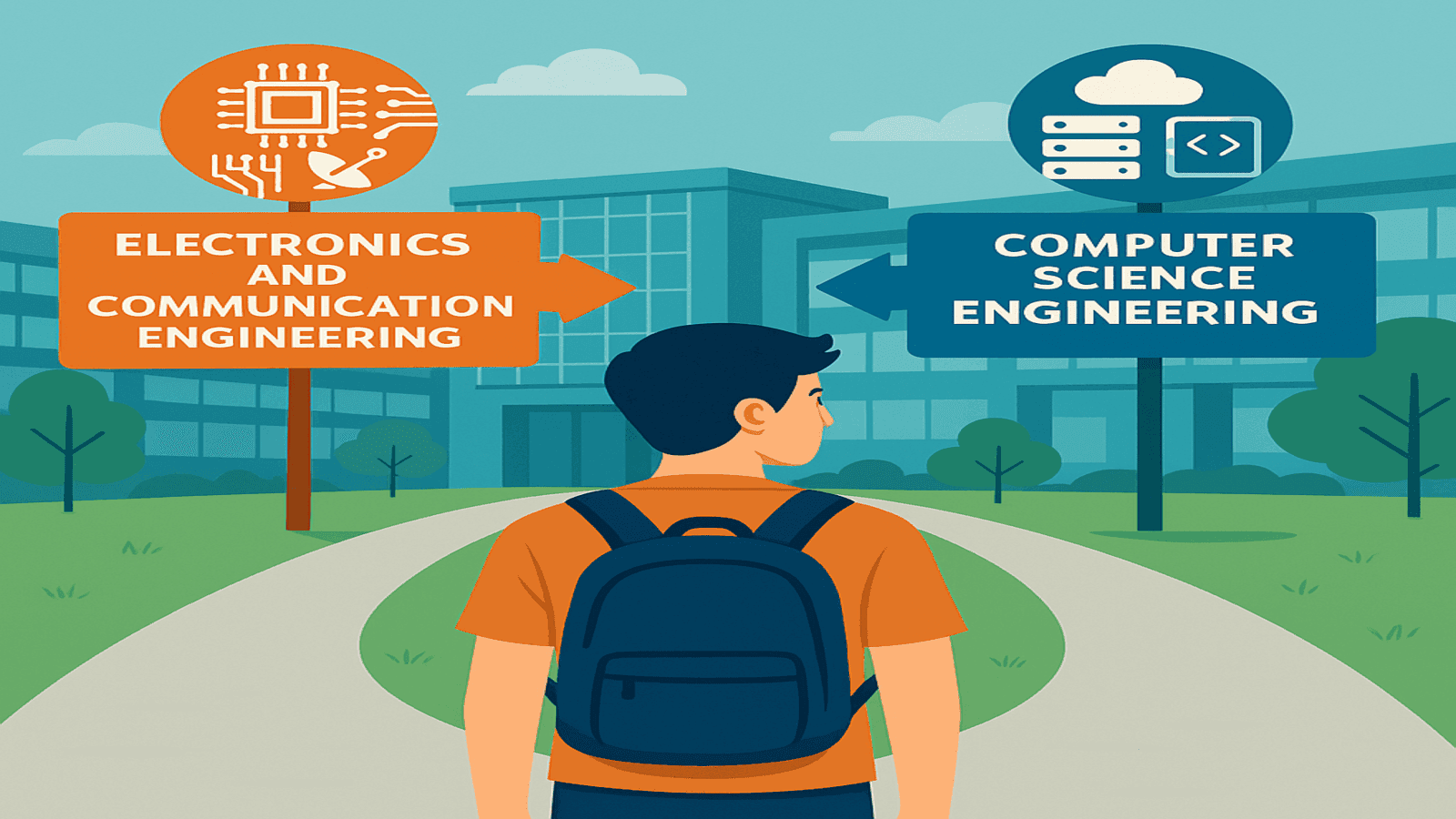Introduction
Choosing between CSE or ECE is one of the most crucial decisions for aspiring engineering students. On one side, you have the ECE full form—Electronics and Communication Engineering, a field driving innovations in wireless communication, robotics, and chip design. On the other hand, you have Computer Science Engineering, the digital backbone of software development, AI, and data science.
In this comprehensive blog, we will explore everything from the ECE engineering syllabus to the CSE course structure, salary expectations, career scope, and more. Whether you're asking “which is best, CSE or ECE?” or wondering what exactly ECE engineers do, this guide will help you find answers.
Understanding the ECE Full Form and Its Relevance
The ECE full form in engineering is Electronics and Communication Engineering. This domain highly focuses on creating and enhancing electronic circuits, devices, and systems used in modern communication technologies. Unlike EEE (Electrical and Electronics Engineering), which primarily deals with power and electrical systems, ECE dives deeper into signal processing, microprocessor design, and communication networks.
In contrast to broader B.Tech electrical engineering, ECE delves deeper into wireless technologies, embedded systems, and VLSI design. Whether it's satellite systems or smart wearables, electronics and communication engineering are foundational in today’s connected world.
Electronics and Communication Engineering Syllabus
The electronics and communication engineering syllabus spans across hardware and communication technologies. A few key subjects include:
- Digital and Analog Electronics
- Signal Processing
- Microcontrollers and Embedded Systems
- VLSI and Nanoelectronics
- Antenna and Wave Propagation
- Optical Fiber Communication
In the ECE syllabus 1st year, students study mathematics, applied physics, basic programming, and circuits. As the semesters progress, subjects like Digital Communication, IoT, and Networking become more prominent. For those researching “ECE branch full form” or “subjects in B Tech electronics and communication,” it's evident that the stream requires both logical and analytical acumen.
ECE Engineering Salary and Scope
So, what kind of compensation does an ECE degree bring? In India, freshers typically earn ₹3–6 LPA, depending on their college and technical skillset. With experience and mastery in VLSI, embedded firmware, or communication protocols, an ECE engineering salary can rise to ₹10–15 LPA, particularly in semiconductor firms or R&D roles.
Globally, ECE graduates are in demand across sectors like telecommunications, defense, automotive electronics, and even software. The scope of electronics and communication engineering is growing rapidly with the advent of 5G, satellite networks, and smart electronics.
Want to understand more about how engineering leads to lucrative careers? Check out our blog on how to become a software engineer for insights into bridging the hardware and software worlds.
Introduction to Computer Science Engineering
While ECE focuses on physical systems and communication hardware, Computer Science Engineering (CSE) centers around computation, software design, and digital logic. Whether you're developing web platforms or machine learning models, CSE plays a pivotal role in modern technological evolution.
The eternal debate—CSE or ECE, which is better—often hinges on one’s interest. If you enjoy solving problems through code, creating algorithms, or building systems software, then CSE may be your calling.
CSE Engineering Syllabus Overview
The CSE syllabus includes:
- Programming in C/C++/Python
- Data Structures and Algorithms
- Operating Systems
- Databases and Cloud Computing
- Artificial Intelligence and Cybersecurity
- Web and App Development
Early semesters introduce foundational logic and programming, while advanced semesters include full-stack development, data science, and machine learning. Curious about industry relevance? Our blog on the importance of internships explains how hands-on learning can boost your engineering career.
CSE vs ECE: Which Offers Better Career Scope?
| Feature | ECE | CSE |
| Syllabus Focus | Circuits, Signal Processing, Embedded Systems | Programming, Databases, AI, Cybersecurity |
| Industries | Telecom, Hardware, Aerospace, Defense | IT, Fintech, Software, EdTech, Startups |
| Starting Salary | ₹3–6 LPA | ₹4–8 LPA |
| Future Scope | IoT, 5G, Robotics, VLSI | AI/ML, Web 3.0, Cloud, Big Data |
| Top Recruiters | Qualcomm, Texas Instruments, DRDO | Google, Microsoft, Amazon, Infosys |
The difference between CSE and ECE becomes clearer once you weigh core subjects and future potential. While CSE usually has an edge in placement packages, ECE opens doors to specialized and high-demand niches globally.
How to Decide Between ECE and CSE
Choosing CSE or ECE isn’t about which stream is easier, but rather where your interests lie.
If you enjoy building logic circuits, understanding how devices communicate, and working with hardware-software integration, ECE might be the right fit. On the other hand, if you love solving coding problems and building applications, then CSE is a better option.
Also, consider the ECE future scope in cutting-edge domains like embedded AI, autonomous vehicles, and smart grid technologies. For those looking into electronic communication engineering, ask yourself if hardware innovation excites you more than software design.
FAQs
Can ECE students apply for software jobs?
Yes, ECE students can apply for software roles by learning about programming languages, data structures, and tools commonly used in the IT industry. Many companies welcome ECE graduates who have upskilled in coding or have completed software internships.
Which is better for government jobs: CSE or ECE?
ECE offers broader opportunities in core government sectors such as ISRO, DRDO, BSNL, and Indian Railways. While CSE graduates can also apply to IT-based government roles, ECE has a slight edge in technical PSU jobs and electronics-based departments.
Does CSE have more international job opportunities than ECE?
CSE generally has higher global demand due to the software industry's international scale. However, electronics and communication engineering graduates also find opportunities abroad, especially in semiconductor industries, telecom, and embedded system companies.
What is the difference between CS vs CE and ECE vs CSE?
CS vs CE compares Computer Science (software-focused) and Computer Engineering (hardware-software mix), while ECE vs CSE contrasts electronics-based roles with purely software-driven careers. CE overlaps with both CSE and ECE in some curricula.
Which branch surpasses the entrepreneurship opportunities: CSE or ECE?
CSE has an upper hand due to lower startup costs and access to digital platforms. However, ECE graduates can excel in hardware innovation, IoT product development, and electronics manufacturing startups with the right ecosystem.











